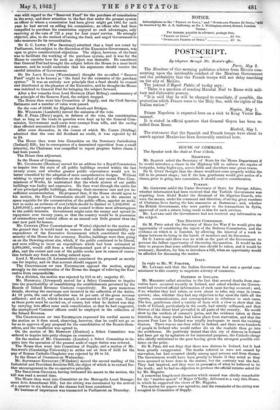HIGHWAYS.
Mr. SLANEY asked the Secretary of State for the Home Department if he would introduce a clause in the Highway bill to enforce the repairs of footpaths, being highways, across fields and elsewhere near great towns.
Sir G. GREY thought that the clause would not come properly within the bill in its present shape ; but if the hon. gentleman would give notice of a clause, prior to going into committee, it should receive consideration.
TURKEY.
Mr. Gam= asked the Under Secretary of State for Foreign Affairs, whether information bad been received that the Turkish Government was requiring from Abdel Bader the dismissal of his Algerian Guards, who were the means, under his command and direction, of saving great numbers of Christian lives during the late massacres at Damascus ; and, whether the British Government, who were parties to the transactions in Syria, approved of such a return being made to him for such services.
Mr. Larsen said the Government had not received any information on the subject.
1THE DEFENCE COMMISSION.
Sir M. Pero asked the Secretary of State for War if he would give the opportunity of considering the report of the Defence Commission, and the evidence on which it is founded, by allowing the interval of a week to elapse between its being in the hands of members and its discussion.
Sir G. LEWIS said there was no wish on the part of the Government to prevent the fullest opportunity of discussing the question. It would be his duty to propose that some additional sum should be taken, and it would be necessary, therefore, for him to introduce a bill, when an opportunity would be afforded for discussing the matter.
ITALY.
In reply to Mr. W. FORSTER, Mr. LAYARD said that the Italian Government had sent a special com- missioner to this country to negotiate a treaty of commerce.
DISTRESS IN IRELAND.
Mr. MAGUIRE called attention to the fact that several deaths from star- vation have occurred recently in Ireland, and asked whether the Govern- ment had received official information of such cases having occurred ; and, if so, whether they had taken, or were about to take, any steps in conse- quence; also, whether they had any objection to lay upon the table all the reports, communications, and correspondence in reference to such cases. The hon. gentleman cited a variety of facts with a view to show that the trade of Ireland, particularly in the south, had utterly collapsed, and that distress of the direst kind prevailed in all parts of the country. He would show by the verdicts of coroner's juries, and the evidence taken at those inquiries, that many deaths had taken place from starvation, and that the present Poor Law in Ireland was totally inadequate to meet the existing distress. There was no out-door relief in Ireland, and there were hundreds of people in Ireland who would rather die on the roadside than go into the workhouse. He positively denied that this cry of distress in Ireland had been got up by agitators or for interested purposes, the Catholic clergy who chiefly ministered to the poor having given the strongest possible evi- dence on the point.
Sir R. PEEL did not deny that there was distress in Ireland, but it had been greatly exaggerated. The deaths referred to were not caused by starvation, but had occurred chiefly among aged persons and from disease. The Government would have been greatly to blame if they acted as they were assumed to have done in the matter, but the contrary was the fact. They had inquired, and they were in possession of what he believed to be the truth ; and he had no objection to produce the official returns asked for by Mr. Maguire. A somewhat lengthened discussion which ensued was chiefly remarkable for the "maiden speech" of Major O'Reilly, delivered to a very thin House, in which he supported the views of Mr. Maguire. The motion for papers was agreed to, and the remainder of the sitting was occupied in Committee of Supply.






























 Previous page
Previous page